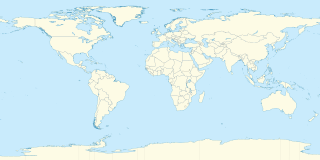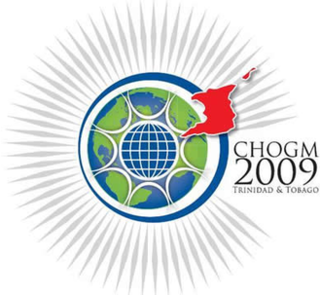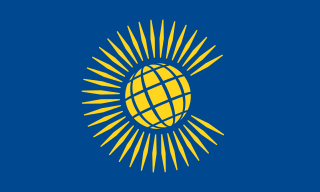
The Commonwealth Heads of Government Meeting is a biennial summit meeting of the de facto leaders from all Commonwealth nations. Despite the name, the head of state may be present in the meeting instead of the head of government, especially among semi-presidential states. Every two years the meeting is held in a different member state and is chaired by that nation's respective Prime Minister or President who becomes the Commonwealth Chair-in-Office until the next meeting. Queen Elizabeth II, who is the Head of the Commonwealth, attended every CHOGM beginning with Ottawa in 1973 until Perth in 2011, although her formal participation only began in 1997. She was represented by the Prince of Wales at the 2013 meeting as the 87-year-old monarch was curtailing long-distance travel. The Queen attended the 2015 summit in Malta and the 2018 summit held in London.
The Commonwealth Secretariat is the main intergovernmental agency and central institution of the Commonwealth of Nations. It is responsible for facilitating co-operation between members; organising meetings, including the Commonwealth Heads of Government Meetings (CHOGM); assisting and advising on policy development; and providing assistance to countries in implementing the decisions and policies of the Commonwealth.

Percival Noel James Patterson, ON, PC, QC, popularly known as P.J. Patterson, is a Jamaican former politician who served as the sixth Prime Minister of Jamaica from 1992 to 2006. He was the leader of the People's National Party from 1992 to 2006, and the Member of Parliament (MP) for the constituency of Westmoreland South Eastern from 1970 to 1980 and again from 1989 to 1993. Following a constituency reorganization, he served as the MP for Westmoreland Eastern from 1993 to 2006. He retired from all of these positions in January 2006. He was married to Shirley Field-Ridley with whom he had two children, Richard and Sharon.

The Commonwealth Secretary-General is the head of the Commonwealth Secretariat, the central body which has served the Commonwealth of Nations since its establishment in 1965, and responsible for representing the Commonwealth publicly. The Commonwealth Secretary-General should not be confused with the Head of the Commonwealth, who is currently Elizabeth II.
The Harare Commonwealth Declaration was a declaration of the Commonwealth of Nations, setting out the Commonwealth's core principles and values, detailing the Commonwealth's membership criteria, and redefining and reinforcing its purpose. The Declaration was issued in Harare, Zimbabwe, on 20 October 1991, during the twelfth Commonwealth Heads of Government Meeting. It reaffirmed the political principles laid out in the Singapore Declaration of twenty years before, and is considered one of the two most important documents to the Commonwealth's uncodified constitution.

Commonwealth of Nations membership criteria are the corpus of requirements that member states and prospective member states must meet to be allowed to participate in the Commonwealth of Nations. The criteria have been altered by a series of documents issued over the past eighty-two years.

The republics in the Commonwealth of Nations are the sovereign states in the organization with a republican form of government. As of 3 February 2020, 31 out of the 54 member states were republics. Elizabeth II, who is the monarch in the Commonwealth realms, is also still the titular Head of the Commonwealth organization in a personal capacity, but this role does not carry with it any power; instead, it is a symbol of the free association of Commonwealth members.
The London Declaration was a declaration issued by the 1949 Commonwealth Prime Ministers' Conference on the issue of India's continued membership of the Commonwealth of Nations, an association of independent states formerly part of the British Empire, after India's transition to a republican constitution.
The Millbrook Commonwealth Action Programme on the Harare Declaration, sometimes abbreviated to just Millbrook, is a policy programme of the Commonwealth of Nations, designed to implement and uphold the Harare Declaration, which sets out the basic political membership criteria of the Commonwealth. The programme was agreed and announced on 12 November 1995 at Millbrook Resort, near Queenstown, New Zealand, at the conclusion of the fourteenth Commonwealth Heads of Government Meeting.
The Singapore Declaration of Commonwealth Principles was a declaration issued by the assembled Heads of Government of the Commonwealth of Nations, setting out the core political volunteering values that would form the main part of the Commonwealth's membership criteria. The Declaration was issued in Singapore on 22 January 1971 at the conclusion of the first Commonwealth Heads of Government Meeting (CHOGM). Along with the Harare Declaration, issued in 1991, it is considered one of the two most important documents to the Commonwealth's uncodified constitution.
The Edinburgh Declaration was a declaration by the heads of government of the Commonwealth of Nations concerning the organisation's membership criteria. Part of the final communiqué issued at the end of the fifteenth Commonwealth Heads of Government Meeting (CHOGM), the Declaration was an endorsement of the report of the Inter-Governmental Group on Criteria for Commonwealth Membership (IGCCM). It was issued on 27 October 1997, in Edinburgh, Scotland.
This is a timeline of the Commonwealth of Nations from the Balfour Declaration. Some regard the Balfour Declaration as the foundation of the modern Commonwealth.
The Commonwealth Heads of Government Meeting 2007 was the twentieth Meeting of the Heads of Government of the Commonwealth of Nations. It was held in Kampala, Uganda, between 23 November and 25 November 2007, and was hosted by President Yoweri Museveni.
The Commonwealth Heads of Government Meeting 1997 was the fifteenth Meeting of the Heads of Government of the Commonwealth of Nations. It was held in Edinburgh, Scotland, between 24 October and 27 October 1997, and hosted by Prime Minister Tony Blair.

The Commonwealth of Nations is a voluntary association of 54 sovereign states. Nearly all of them are former British colonies or dependencies of those colonies.

The Commonwealth Heads of Government Meeting 2009 was the twenty-first Meeting of the Heads of Government of the Commonwealth of Nations. It was held in Port of Spain, Trinidad and Tobago, between 27 and 29 November 2009, and was hosted by that country's Prime Minister, Patrick Manning.
The Commonwealth Heads of Government Meeting 2003 was the eighteenth Meeting of the Heads of Government of the Commonwealth of Nations. It was held in Abuja, Nigeria, between 5 December and 8 December 2003, and hosted by President Olusegun Obasanjo.

Zimbabwe and the Commonwealth of Nations have had a controversial and stormy diplomatic relationship. Zimbabwe is a former member of the Commonwealth, having withdrawn in 2003, and the issue of Zimbabwe has repeatedly taken centre stage in the Commonwealth, both since Zimbabwe's independence and as part of the British Empire.

The Commonwealth of Nations, generally known simply as the Commonwealth, is a political association of 54 member states, nearly all former territories of the British Empire. The chief institutions of the organisation are the Commonwealth Secretariat, which focuses on intergovernmental aspects, and the Commonwealth Foundation, which focuses on non-governmental relations between member states.
A special member was a member of the Commonwealth of Nations whose participation was limited in certain functions. Originally, it was a status held by a few newly joined countries, whose involvement was limited by its own limited financial resources. More recently, the name has been changed to member in arrears, from the 2007 CHOGM on the recommendation of the Committee on Commonwealth Membership. The guidelines came from the 2003 CHOGM in Abuja that strengthened and replaced the 1999 CHOGM Durban guidelines.